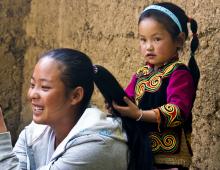Can poor minority people in the mountains of Southwest China join China's rapidly changing mainstream society with reasonably fair life chances? Can a remote community pursuing a subsistence livelihood in an ecosystem severely damaged by top-down management restore its ecology to sustainable functioning? Can interdisciplinary research and active participation on the community's own terms answer these questions? Can we make a difference in the answer?
Since 1993, I have been visiting the villages of Yangjuan and Pianshui in Yanyuan County, Liangshan Yi Autonomous Prefecture. At first it was just research, on family economy and inter-ethnic relations between the local Nuosu or Yi people and the dominant Han Chinese. But by the late 90s, a group of us, including natives of the area, Han Chinese and Yi ethnological researchers, Jesuit priests from Taiwan, and a US academic, decided to build a school in the community to help local people get at least an elementary education. The school opened in 2000, and in 2002 I started involving UW and Sichuan University students and faculty in multidisciplinary research on culture, society, and ecology.
When the first class graduated from the elementary school in 2005, we got the idea of establishing a scholarship fund, selling calendars with pictures of the local environment and culture, and using the proceeds to help graduates of the school go on to middle school. Soon we made this official by establishing the Cool Mountain Education Fund, which has now given over 500 scholarships to graduates of Yangjuan School who have gone on to middle school, high school, and now college. This year, 36 Yangjuan graduates are in junior college and 7 are in regular bachelor's degree programs.
Has our research and our scholarship program made a difference? That's what we're trying to find out. This isn't a controlled experiment pitting scholarship recipients against non-recipients, but we do know that very few Nuosu communities in Liangshan can match our record. And the ecology seems to be healing, though our ecological research has had very little to do with it; most of the initiatives have been local. You can read more in the journalsEcology and Society and The Asia Pacific Journal.
